European chemistry -Biden announces new anti-Russian sanctions 27-02-2024
European chemistry
Crude Oil Prices Trend
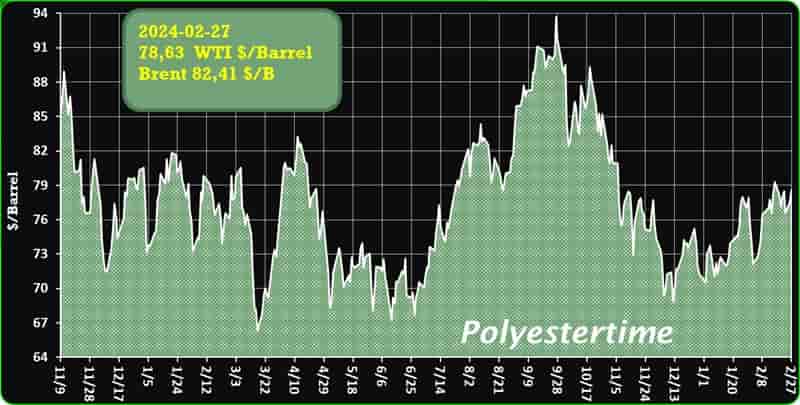
Crude Oil Prices Trend by Polyestertime
In 2023, the European chemistry sector continued to grapple with challenges, exhibiting weaknesses that persisted from the previous years
Production within the EU27 witnessed a significant decline, dropping by 8 percentage points compared to 2022 levels. Particularly, sectors such as petrochemicals and polymers experienced subdued performance.
Reflecting on the broader economic landscape, the European chemical industry faced a trifecta of setbacks: decreased production, dwindling exports, and reduced imports throughout the year. European chemistry
This grim reality, succinctly captured by the European chemical industry federation Cefic, marks the sector’s fifth consecutive year of decline.
Within the EU27 region, production plummeted by -8%, while exports experienced a loss of 16 billion euros, sliding from 224 to 208 billion (-7% in the first 11 months alone). Notable drops were observed in sales to key markets like Russia (-27%), Brazil (-22%), the United States (-17%), and China (-11%).
Despite a slight reprieve in the import figures, shrinking by 46 billion to 176 billion (-21% between January and November), the overall trade balance remained precarious. The decline in European chemical turnover was stark, registering at -14.9%, amounting to 661 billion euros, albeit showing marginal signs of recovery towards the year’s end.
Across various sectors, the downturn was palpable, with basic chemicals, petrochemicals, and polymers witnessing double-digit declines. European chemistry
Basic inorganic products and specialties experienced comparatively milder contractions. The sole silver lining was consumer chemistry, with a modest increase of +3.2%.
Moreover, the capacity utilization rate remained constrained, hovering at 74.7% in the fourth quarter of 2023, reminiscent of the levels seen during the initial COVID-19 lockdown in 2020. Cefic’s assessment underscores the prolonged challenges ahead, attributing the industry’s woes to persistently high energy costs and vulnerabilities stemming from reliance on foreign trade amid geopolitical uncertainties. Germany’s slow recovery further underscores the uphill battle facing not just Germany but most EU27 nations. European chemistry
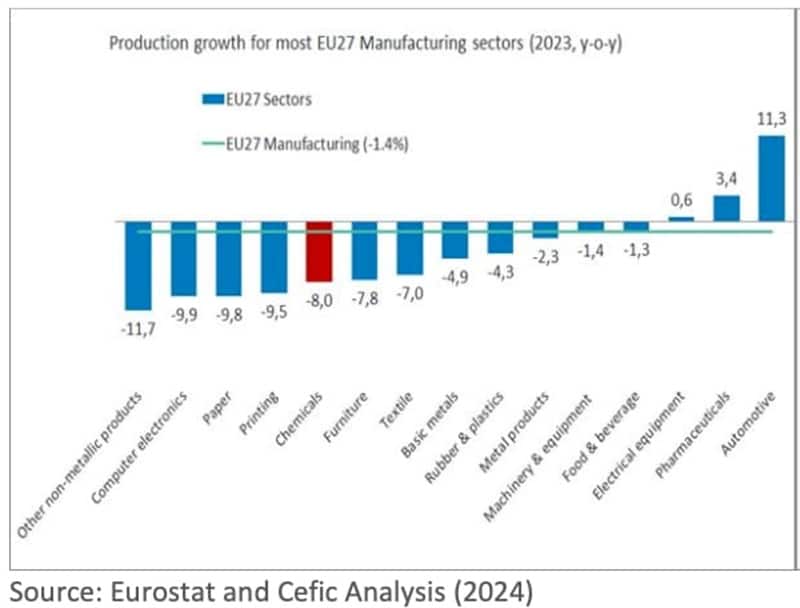
Biden announces new anti-Russian sanctions
On February 23, President Joe Biden declared the imposition of over 500 fresh sanctions on Russia, aiming at key sectors such as finance and defense, as reported by Interfax. In a statement released by the White House, Biden affirmed, “Today, I am announcing more than 500 new sanctions against Russia. These sanctions will target various aspects including Russia’s financial sector, defense industrial base, procurement networks, and sanctions evaders.”
The United States is instituting novel export limitations affecting approximately 100 establishments that provide support to Russia’s defense industry, Biden disclosed. Furthermore, he emphasized, “We are taking action to further diminish Russia’s energy revenues.” European chemistry
This move underscores the escalating tensions between the United States and Russia, with Biden’s administration opting for economic measures as a response to Russian actions. The sanctions are intended to exert pressure on Russia, sending a clear message of disapproval for its policies and actions. The announcement signifies a significant development in the ongoing geopolitical dynamics, potentially reshaping the relationship between the two nations and impacting global affairs.
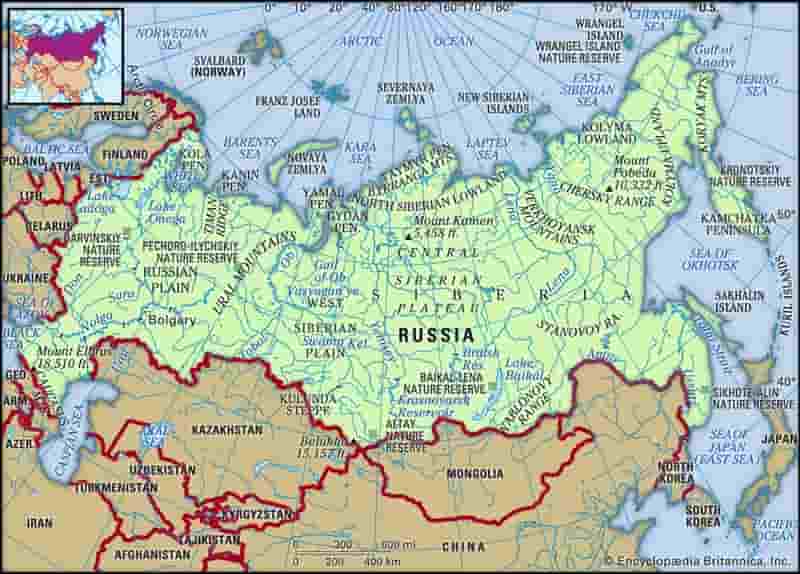
Kolon Benit, the technological arm of Kolon Group, has recently upgraded the Kolon Industries Co. (KIC) facility in Gumi, North Gyeongsang Province with cutting-edge smart factory technology
This advancement significantly boosts the efficiency of aramid production, a high-performance material vital in various industries.
Aramid, scientifically known as aromatic polyamide, is prized for its exceptional properties, including a high melting point of up to 500 degrees Celsius and strength surpassing steel by five times on an equal weight basis. It finds essential applications in manufacturing sectors such as body armor, optical cables, and electric vehicle tires.
The facility upgrade aligns with Kolon Industries’ strategy to double aramid production capacity. The smart factory technology empowers personnel with comprehensive oversight, covering quality inspection, packaging, and inventory management. Real-time monitoring allows prompt identification and resolution of quality issues, ensuring adherence to rigorous standards. European chemistry
Integration of manufacturing data with Enterprise Resource Planning (ERP) facilitates informed decision-making at an executive level, streamlining operations and resource allocation for organizational growth.
Kolon Benit plans further enhancements with data-driven solutions like the Sales Product Inventory Communicator (SPIC), enabling agile response to market demands. Additionally, the deployment of an Energy Monitoring System (EMS) promotes eco-friendly practices, optimizing energy consumption and waste reduction.
This deployment at KIC signifies Kolon Industries’ commitment to operational excellence and market leadership in aramid production. Through continuous innovation and investment in advanced technology, Kolon Benit aims to drive sustainable growth and deliver value across the value chain. European chemistry
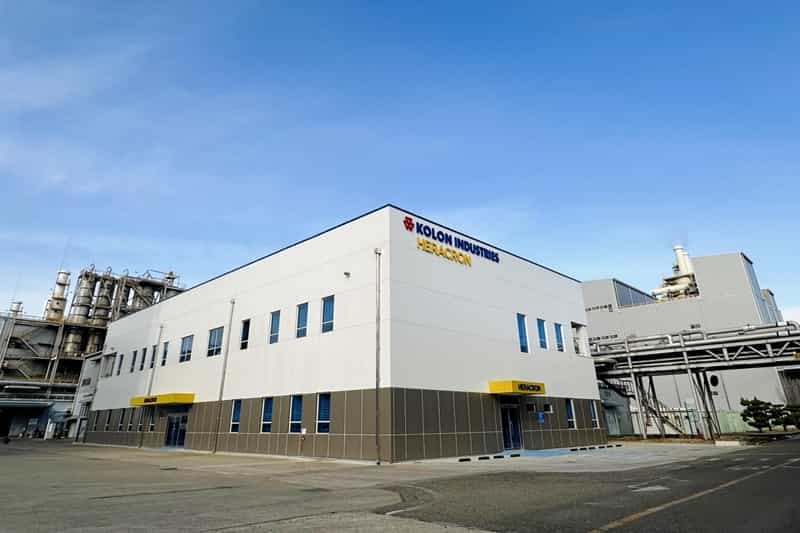
Carrington Textiles and The LYCRA Company Partner to Showcase Stretch Military Fabric in Germany
Carrington Textiles, a global military fabrics manufacturer, is proud to announce their participation at Enforce Tac 2024, a trade fair catering to members of official security agencies and armed forces. Scheduled to take place from February 26th to 28th, 2024, in Nuremberg, this event serves as an ideal platform for industry leaders to unveil groundbreaking solutions tailored for the defence sector.
Carrington Textiles is set to make a significant impact at the event by showcasing their latest breakthrough – Spartan HT Flex Lite fabric. Engineered with military-grade INVISTA T420 nylon 6.6 staple fibre and featuring a strategic 2% LYCRA® fibre content, Spartan HT Flex Lite represents a paradigm shift in military textile development. European chemistry
The incorporation of LYCRA® fibre into Spartan HT Flex Lite offers unparalleled benefits to military professionals. This innovative fabric provides exceptional comfort akin to cotton, while simultaneously delivering added mobility thanks to its integrated stretch properties. Spartan HT Flex Lite is engineered to endure the rigours of military environments, making it the ideal choice for those who demand both performance and durability.
Carrington Textiles invites trade editors and industry professionals to visit their booth at Enforce Tac 2024 to experience firsthand the revolutionary Spartan HT Flex Lite fabric. Attendees will have the opportunity to explore the fabric’s features, learn about its technical specifications, and discover how it meets the evolving needs of military professionals. European chemistry
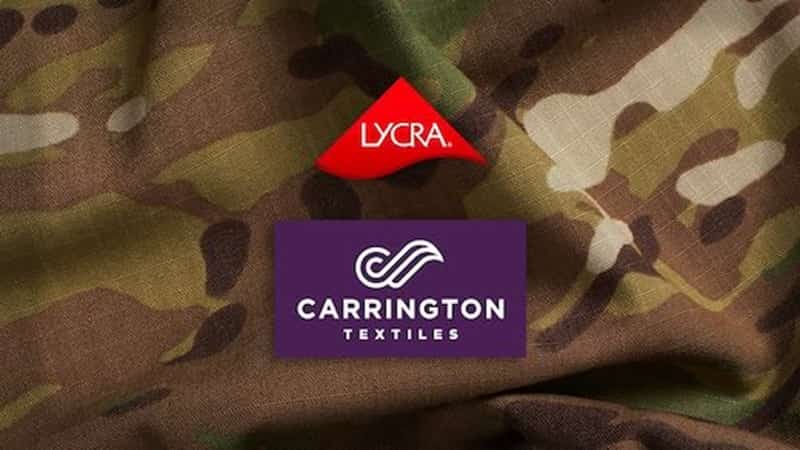
Impacts of Auto’s Switch to Sustainability
Of all the trends you’ll see at NPE2024, this one is BIG. Not only is the auto industry transitioning to electrification but there are concerted efforts to modify the materials used, especially polymers, for interior applications.
If you look at the dashboard of a Tesla Model 3 the notable thing is something that isn’t there. As in the array of buttons, knobs and switches that have historically be part of the HVAC and infotainment controls for a vehicle. All of those things are typically injection molded. But they are gone. Manufacturing consultant Laurie Harbour, who specializes in automotive, points out that Tesla’s elimination of these comparatively small components has a big impact on moldmakers and molders, especially given that other vehicle manufacturers are following Tesla’s lead. European chemistry
“While the attention in the auto industry seems to be all about lithium for batteries, there is a huge effort underway to use materials — many of which are polymers — that support sustainability.” (Visit the Sustainability Hub at NPE2024 May 6-12 in Orlando to stay on top of the trend.)
And there is another thing to notice about that Model 3 (or Model Y or other models) No leather. Well, there is what’s referred to as “vegan leather.” But it is actually a vinyl.
And there is another thing to notice about that Model 3 (or Model Y or other models) No leather. Well, there is what’s referred to as “vegan leather.” But it is actually a vinyl.

AUTEFA Solutions to present innovations in nonwoven technology with focus on sustainability at Techtextil Frankfurt
At Techtextil Frankfurt 2024, AUTEFA Solutions will present innovations in nonwoven technology with a clear focus on sustainability, including energy efficiency, fiber selection, life cycle management and emission reduction. As a leading supplier of turnkey nonwoven systems and machinery, AUTEFA Solutions offers needle punching lines, aerodynamic web forming lines, spunlace and thermobonding lines. European chemistry
“Techtextil provides not only a platform for innovation and progress, but also a valuable opportunity to engage directly with customers. Through direct interaction, we not only learn about their current needs, but also lay the groundwork for future developments. We in particular are ready to highlight sustainable applications with our Airlay lines and demonstrate energy optimization in oven and dryer technology. In addition, we will emphasize our core competence in complete needle punching lines with specific features for geotextile, filtration, and artificial leather applications,” explains André Imhof, CEO, AUTEFA Solutions Austria and Switzerland. European chemistry
The sustainable use of resources is a key challenge. Nonwovens technology originated from the concept of recycling to reduce manufacturing costs and process textile waste and previously unusable materials into fabric structures. With growing environmental awareness, there is an increasing demand for textile recycling solutions or the conversion of used textiles into new products (upcycling).
Nonwoven lines that mechanically, thermally, or chemically consolidate fiber webs can process almost all mechanically and chemically recycled fibers. Fibrous materials down to granulate can also be processed. European chemistry
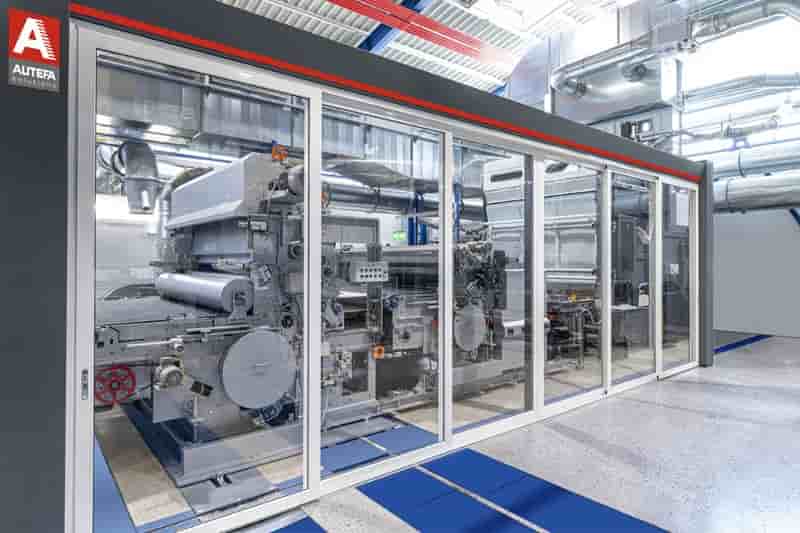
Indonesia may delay PE, PP import quota enforcement
The Indonesian trade ministry may delay the enforcement of a mandatory quota for polyethylene (PE) and polypropylene (PP) imports to Indonesia that was earlier expected to come into effect on 10 March, according to local sources.
The enforcement could be delayed by at least three months, based on local associations’ appeal requests to the trade ministry, and this may be announced soon, according to market sources. The associations had mostly requested for a grace period to be given to PE and PP importers after the mandate takes effect on 10 March. No official announcements have been made. European chemistry
Local associations including the Indonesian chamber of commerce and industry (Kadin), Indonesian employers association Apindo, Indonesian food and beverage association Gapmmi and several plastics associations including Aphindo, Giatpi and Abofi have opposed or sought delays in the import quota mandate, mainly because of a lack of clarity in the application processes that could affect converters’ operations later.
International business associations in Indonesia including the Korean chamber of commerce and industry Kocham, American chamber of commerce Amcham and the European chamber of commerce Eurocham have also undertaken similar courses of action.
The Indonesian trade ministry on 11 December last year announced that Indonesian PE and PP importers will need to apply for specific quotas to be able to import polymer resins from 10 March this year, or risk their cargoes getting rejected during customs clearance. A surveyor report is also required for resin imports. Importers can only begin their applications from 10 March. European chemistry
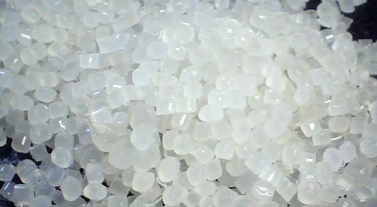
European chemistry
